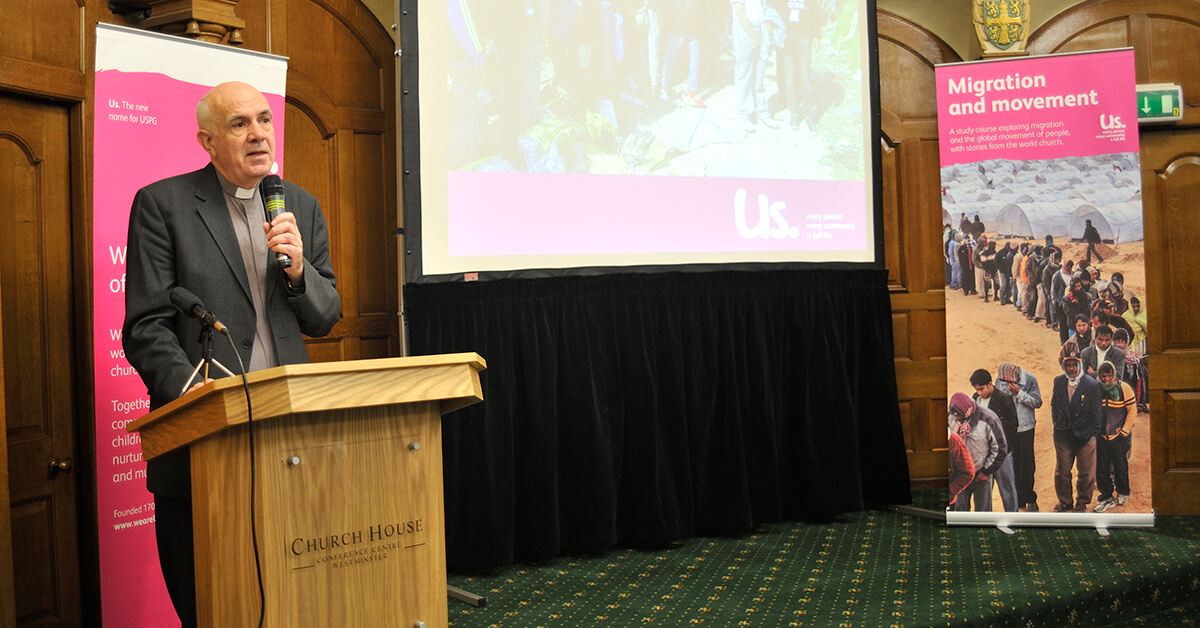Based on report from Us and on the Church of England website:
Guest speaker Fr Malcolm Bradshaw, from the Anglican Chaplaincy in Athens (Diocese in Europe), spoke about the dangers facing refugees arriving in Greece by boat and the vital role the Church is playing in filling in gaps left by government and aid agencies.
Speaking on Wednesday 25 November, Fr Malcolm said: ‘Last night 5,000 came in, tonight another 5,000, and tomorrow another 5,000, and all those who thought the winter months might see a slow down – at the moment there is only the slightest indication of that kind of slowdown taking place.’
‘The smugglers are totally in control of this movement; no government is. They are the people who are advertising to the Syrians: “We can do it, give us the money and we will take you.” And there is no government intervention.’
Watch Fr Malcolm’s moving talk: https://vimeo.com/146918684
Isobel Owen, Programme Officer from Anglican Alliance who visited Greece with Us in October 2015, said: ‘One of the things that really impacted on me was how young the people travelling are, including many babies, children and unaccompanied minors.’
Accordingly, Isobel commented that the Salvation Army in Athens is giving out, among other items, ‘little brightly coloured rucksacks for the children filled with practical items: food, socks and hygiene items, but also little toys, things that remind them in this desperate situation they are children, they are human, and that we recognise this.’
Isobel said refugee families could be clearly seen, openly talking to the traffickers, haggling over prices for transport, trying to work out which route to take and making incredibly difficult decisions about their futures.
Isobel highlighted how the churches recognise the humanity of the refugees and migrants; how simple acts showing welcome and care can bring help restore a sense of value and dignity.
Isobel also mentioned that the Anglican Alliance is working with the Church of England Diocese in Europe and Convocation of Episcopal Churches in Europe to map the response from local churches across the region. The initial findings show the commitment and creativity of these local churches, building on their own skills and assets to make a difference.
Watch Isobel’s talk: https://vimeo.com/146926806
Speaking after the event, Rachel Parry, Us Director for Global Relations, said of the event: ‘This humanitarian crisis is on such a scale that Greece, a nation already on its knees with the austerity situation, cannot possibly handle it alone.”
Find out more and support the work of Us and the Diocese in Europe in their joint appeal to support the refugee response:
http://www.weareus.org.uk/news/europe/
Speaking later the same morning at the General Synod debate on migration, the Bishop of Gibraltar in Europe, Robert Innes, said:
‘We face a problem of immense scale and seriousness. EU leaders are talking about the biggest crisis to hit Europe since WWII and at the political level European leaders struggle to be coordinated and have not been able to offer solutions.
The crisis requires immediate, medium term and long term action – there’s an immediate need for humanitarian assistance, but medium term we need to establish safe routes of passage so migrants don’t fall in to the hands of the some 29 000 people working as traffickers in Europe. Long term we face challenges of economic justice, peace-making and climate justice so people can stay in their homelands.
Many churches in my diocese are already working with migrants – they are supplying them with warm clothing, perhaps more importantly they provide some of the social and spiritual needs: human contact, helping with language, involving asylum seekers where appropriate in church and family activities, building bridges that help people feel valued and welcome. People in my churches have had themselves to struggle with living in cultures which are not their own and so they know how to help others do that’.
Also speaking at the debate the Archbishop of Canterbury, Justin Welby, said that the Church must be “deeply committed to the welcome and private sponsorship of people coming in.”
Following the debate the following motion was adopted by General Synod:
‘That this Synod, recognising that almost 60 million individuals have been forcibly displaced worldwide as a result of persecution, conflict or generalised violence, a fifth of them because of the tragic conflict in Syria, and noting the compassionate response of British people to the suffering and needs of those displaced by conflict and other causes:
(a) urge parishes and dioceses to work closely with local authorities and other community partners, to provide practical and sustainable resources and structures for the resettlement of vulnerable refugees and to pray for all those seeking to address the causes as well as the symptoms of this crisis;
(b) welcome both the scale of the aid provided by Her Majesty’s Government to those suffering as a result of the conflict in Syria and its decision to resettle vulnerable Syrian refugees, while calling on it to increase the number significantly beyond its initial target of 20,000 over five years;
(c) call upon the Government to work with the United Nations High Commissioner for Refugees to ensure that vulnerability to religiously motivated persecution is taken into account when determining whom to receive into Britain;
(d) call upon the Government to work with international partners in Europe and elsewhere to help establish safe and legal routes to places of safety, including this country, for refugees who are vulnerable and at severe risk; and
(e) call upon the Government to take a fair and proportionate share of refugees now within the EU, particularly those with family already legally resident in the UK.’.
The Synod carried the motion, including an amendment which is shown in italics.
Photo caption:
Revd Malcolm Bradshaw, of the Anglican Chaplaincy in Athens, speaking at the Us breakfast meeting at General Synod. Credit: Us

